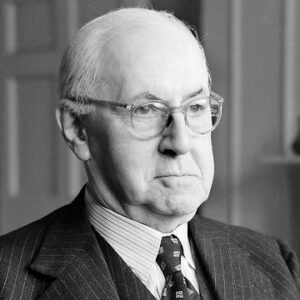Sir Henry Hallett Dale was a British physiologist and pharmacologist who, with German pharmacologist Otto Loewi, shared the Nobel Prize in Medicine in 1936 “for their discoveries in the chemical transmission of nerve impulses.” He began his research career at the Wellcome Physiological Research Laboratories shortly after graduating from Trinity College, Cambridge, with a degree in physiology and zoology. He graduated from Cambridge with a medical degree in 1909 and went on to become the Director of the National Institute for Medical Research in London. He was also the Royal Society’s Secretary and eventually President. During his research career, he discovered the chemical histamine in animal tissues and discovered that its physiological effects, such as blood vessel dilatation and smooth muscle contraction, were identical to the symptoms of allergic and anaphylactic reactions. He isolated acetylcholine, demonstrated its presence at nerve terminals, and established its occurrence in animal tissue. His research established the importance of acetylcholine in nerve impulse chemical transfer. He was instrumental in the development of worldwide standards for active biological compounds such as hormones, antitoxins, and vaccinations. He received Knighthood, the Order of Merit, and the Knight Grand Cross of the Order of the British Empire throughout his lifetime.
Childhood and Adolescence
Henry Hallett Dale was born in London on June 9, 1875, to ceramics businessman Charles James Dale and his wife, Frances Anne Hallett. He was one of six siblings.
He went to London’s Tollington Park College and subsequently Cambridge’s Leys School. He received a scholarship to Trinity College, University of Cambridge, in 1894.
He received the Coutts-Trotter studentship at Trinity College in 1898 after receiving a First Class in Natural Sciences Tripos (specializing in physiology and zoology). He worked under physiologist John N. Langley for the next two years, and was influenced by Gaskell and Sir Hopkins, resulting in the publishing of his first scientific paper in the Journal of Physiology at the age of 24.
In 1900, he was awarded a scholarship to study clinical medicine at St. Bartholomew’s Hospital in London. He worked at University College London (UCL) under Professor Ernest Starling and was part of the team that performed a vivisection on a dog in 1903, which resulted in the infamous Brown Dog affair. He met his lifelong friend Otto Loewi at UCL.
In 1903, he also spent four months studying under Paul Ehrlich in Frankfurt, Germany, before returning to UCL as a Sharpey Scholar. In the same year, he earned his B.Ch. Cambridge degree.
Career of Henry Hallett Dale
Henry Hallett Dale joined the Wellcome Physiological Research Laboratories as a pharmacologist in 1904. He became Director of these laboratories two years later, in 1906, and stayed in that position for the next six years. Meanwhile, in 1909, he got his M.D. from Cambridge.
In 1914, he was appointed Director of the National Institute for Medical Research’s Department of Biochemistry and Pharmacology in London. He was elected a Fellow of the Royal Society in the same year and served as Secretary from 1925 to 1935.
He was appointed Director of the National Institute for Medical Research in London in 1928 and held the position until 1942. In the meanwhile, he received a knighthood in 1932, and four years later, he and Otto Loewi shared the Nobel Prize in Medicine.
During WWII, he was a member of the cabinet’s Scientific Advisory Committees. From 1940 to 1945, he was President of the Royal Society.
In 1942, he was appointed Fullerian Professor of Chemistry and Director of the Royal Institution’s Davy-Faraday Research Laboratory. In 1944, he was awarded the Order of Merit.
He became involved in the administration of the Wellcome Trust, which supports medical research and scholarships, after 1946. From 1938 to 1960, he was Chairman of the Board of Directors for twenty-two years.
In 1948, he was awarded the Knight Grand Cross of the Order of the British Empire, and from 1948 to 1950, he was President of the Royal Society of Medicine.
Later in life, he backed a worldwide effort to standardize medications and vaccinations. He also championed the use of nuclear energy for peaceful purposes and the importance of scientific study.
Major Projects of Henry Hallett Dale
Sir Henry discovered the chemical histamine in animal tissues in 1911 and discovered that its physiological effects, such as blood vessel dilatation and smooth muscle contraction, were identical to the symptoms of allergic and anaphylactic reactions.
He succeeded in isolating acetylcholine and demonstrating its presence in animal tissue in 1914. He proved its presence at nerve terminals later in the 1930s. His research established the importance of acetylcholine in nerve impulse chemical transfer.
He wrote ‘Adventures in Physiology’ in 1953 and ‘An Autumn Gleaning’ in 1954, in addition to other articles and studies published in medical and scientific magazines.
Achievements & Awards
Henry Hallett Dale and Otto Loewi shared the Nobel Prize in Physiology or Medicine in 1936 for “discoveries relating to chemical transmission of nerve impulses.”
He also earned the Knight Grand Cross of the Order of the British Empire in 1948, the Medal of Freedom (Silver Palm) from the United States of America in 1947, the Grand-Croix de l’Ordre de la Couronne from Belgium in 1950, and the Ordre pour le Mérite from Western Germany in 1955.
Several academic groups and institutions around the world honored him with fellowships, including the Royal Society of Edinburgh and Trinity College, Cambridge. During his lifetime, he got nearly twenty honorary degrees.
History and Legacy
Henry Hallett Dale married Elen Harriet Hallett, his first cousin, in 1904. The couple has two girls and a boy.
After a brief illness, he died on July 23, 1968.
Estimated Net Worth
The estimated net worth of Henry Hallett Dale is unknown.
Trivia
Benjamin Dale, his younger brother, was a talented composer and Royal Academy of Music warden.


